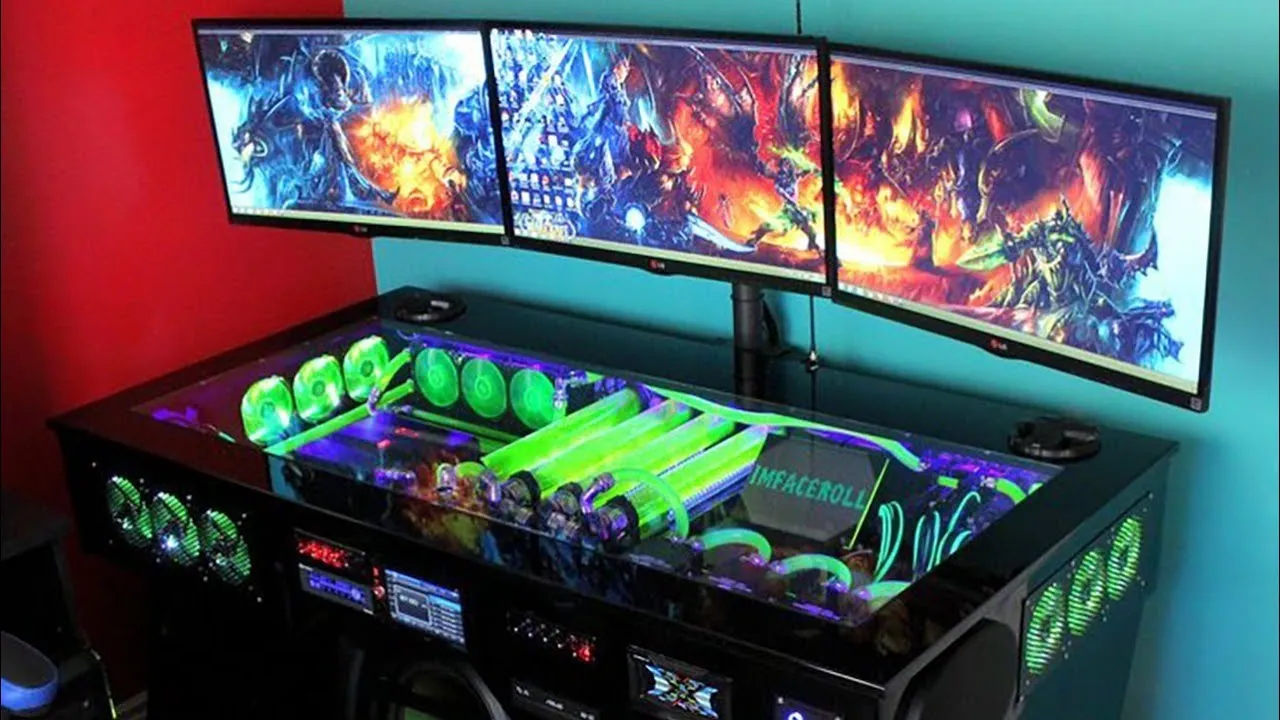With the rise of technology and the Internet, gaming has become more accessible than ever before. Gone are the days when you needed a bulky console or a powerful computer to play video games. Nowadays, all it takes is a decent personal computer and an internet connection to join the millions of gamers around the world.
While gaming has always been popular, the emergence of PC gaming has taken it to a whole new level. This can be seen in the increasing number of online platforms, such as Steam and Epic Games Store, that offer a plethora of PC games for players to choose from. But who are these PC gamers? What drives them to choose PCs over other gaming devices? In this article, we will delve into the statistics and demographics of PC gamers to better understand this growing community.
1. The Rise of PC Gaming

Before we dive into the demographics of PC gamers, let’s take a look at the history of PC gaming and how it has evolved over the years. The first computer game, Spacewar!, was created in 1962, but it wasn’t until the late 1970s and early 1980s that PC gaming started gaining popularity. This was largely due to the introduction of personal computers like the Apple II and the Commodore 64, which had better graphics and sound capabilities compared to earlier models.
In the 1990s, with the launch of Windows and the internet, PC gaming really took off. This decade saw the release of iconic games like Doom, Quake, and Warcraft, which solidified the PC’s position as a dominant gaming platform. Fast forward to today, and PC gaming has continued to grow in popularity, thanks to advancements in technology and the widespread availability of high-speed internet. Now, let’s take a closer look at the demographics of PC gamers and what makes them stand out from other gaming communities.
The Growing Number of PC Gamers
According to a report by SuperData, there were 1.2 billion PC gamers worldwide in 2020, with an estimated growth of 4% year-on-year. This is significantly higher than the number of console gamers, which stood at around 700 million in the same year. In terms of revenue, the global PC gaming market was worth $36.9 billion, making it the largest gaming platform in terms of sales.
This growth can be attributed to several factors, including the increasing availability and affordability of PCs, the rise of online multiplayer games, and the growing popularity of esports. Additionally, the COVID-19 pandemic has also played a role in the increase of PC gamers, as more people turn to gaming for entertainment while staying at home.
2. The Profile of PC Gamers
Now that we have established the significant presence of PC gamers in the gaming industry, let’s take a closer look at who they are and what sets them apart from other gamers.
Age
One of the most notable things about PC gamers is their age range. While console gamers tend to skew towards a younger audience, PC gamers span across all age groups. According to a survey by the Entertainment Software Association (ESA), the average age of a PC gamer is 34 years old, with 24% of PC gamers falling between the ages of 18 and 35.
This is due to the fact that PCs have been around longer than consoles, making them more accessible to older generations. Additionally, the flexibility and versatility of PCs make them appealing to all age groups, whether it’s for work or entertainment purposes.
Gender
Contrary to popular belief, PC gaming is not a male-dominated community. In fact, according to the ESA survey, over half of PC gamers (56%) are female, compared to 48% of console gamers. This can be attributed to the wide variety of games available on PC, including popular genres like simulation and puzzle games that tend to attract more female players.
Income
Another interesting aspect of the profile of PC gamers is their income level. According to a study by Newzoo, 61% of PC gamers come from households with an annual income of over $50,000, with 18% coming from households earning over $100,000. This shows that PC gaming is often seen as a hobby for those who have disposable income to spend on gaming equipment and accessories.
3. PC Gamers vs Console Gamers

Now that we have established the demographics of PC gamers, let’s compare them to console gamers and see how they differ in terms of preferences and behaviors.
Preferences in Games
One of the main differences between PC gamers and console gamers is their preferred type of games. While console gamers tend to favor action-packed, fast-paced games, PC gamers are more interested in slower-paced games that require strategy and critical thinking. This is due to the fact that PCs offer a wider range of game genres, such as RPGs, simulation, and strategy games, that are not as prominent on consoles.
Gaming Habits
Another notable difference between these two gaming communities is their gaming habits. Console gamers typically spend more time playing, with an average of 7 hours per week, compared to PC gamers who spend an average of 6.1 hours per week. However, this doesn’t necessarily mean that console gamers are more dedicated. In fact, PC gamers tend to engage in longer gaming sessions, spending an average of 1.5 hours per session, compared to 1.3 hours for console gamers.
Spending Habits
In terms of spending, PC gamers tend to invest more in their hobby compared to console gamers. According to a study by Nielsen, PC gamers spend an average of $20 more per month on games and in-game purchases than console gamers. This can be attributed to the fact that PC games are often cheaper than console games, and PC gamers tend to make more in-game purchases.
4. The Global Landscape of PC Gamers
Now that we have established the profile of PC gamers, let’s take a look at how this community is distributed around the world and what factors influence their presence in different regions.
Regional Breakdown
According to a report by Statista, Asia-Pacific is the largest market for PC gaming, accounting for 50% of global annual revenue. This is followed by Europe (25%) and North America (23%). This can be attributed to several factors, including the widespread availability of high-speed internet and the prevalence of esports in these regions.
Factors Influencing PC Gaming in Different Regions
Aside from regional differences in income and technological advancements, there are other factors that influence the presence of PC gamers in different parts of the world. For instance, in countries like South Korea, where internet speeds are among the fastest in the world, PC gaming has become a significant part of the culture. In contrast, in countries with lower internet penetration rates, such as India, console gaming remains the dominant platform.
5. The Impact of Esports on PC Gaming
Esports, or competitive video gaming, has become a major driving force behind the growth of PC gaming. While competitive gaming has been around since the early days of PC gaming, it wasn’t until recent years that it gained mainstream recognition and popularity. According to Newzoo, the global esports market was worth $1.08 billion in 2020, with an estimated growth of 14.5% year-on-year.
Demographics of Esports Fans
In terms of demographics, esports fans align closely with the demographics of PC gamers. According to a survey by SuperData, 60% of esports fans are male, and the majority fall between the ages of 18 and 35. Additionally, the average income of esports fans is higher than that of traditional sports fans, with 53% coming from households earning over $50,000 per year.
Influence on the Gaming Industry
The rise of esports has not only impacted the gaming industry but also the entertainment industry as a whole. With massive prize pools, celebrity players, and global tournaments, esports has become a lucrative industry for players, teams, and sponsors alike. This has led to the development of more competitive games and an increase in the number of professional gamers.
6. The Future of PC Gaming

As we have seen throughout this article, PC gaming has come a long way since its humble beginnings. With advancements in technology and the growing popularity of esports, it’s safe to say that PC gaming will continue to thrive in the years to come. But what can we expect from the future of PC gaming?
Advancements in Technology
One of the main driving forces behind the growth of PC gaming has been the continuous advancements in technology. As technology continues to evolve, we can expect to see even more powerful and immersive gaming experiences on PCs. From virtual reality to augmented reality, the possibilities are endless, and PC gamers are at the forefront of these innovations.
Expansion of Esports
Esports is expected to continue its upward trend, with more game developers investing in competitive gaming and more players making a career out of it. The global esports audience is projected to reach 495 million in 2021, with an estimated revenue of $1.56 billion. This will further cement PC gaming’s position as a dominant platform in the gaming industry.
Shift towards Cloud Gaming
With the emergence of cloud gaming services like Google Stadia and Xbox Game Pass, we can expect to see a shift towards online gaming in the future. This will not only make gaming more accessible but also reduce the need for expensive hardware, making it easier for more people to join the PC gaming community.
Conclusion
In conclusion, the demographics and statistics of PC gamers paint a diverse and dynamic picture of this growing community. While it was once seen as a niche market, PC gaming has now become a mainstream form of entertainment, with millions of players around the world. With advancements in technology, the rise of esports, and the growing accessibility of gaming, we can expect to see even more growth and evolution in the world of PC gaming in the coming years.


